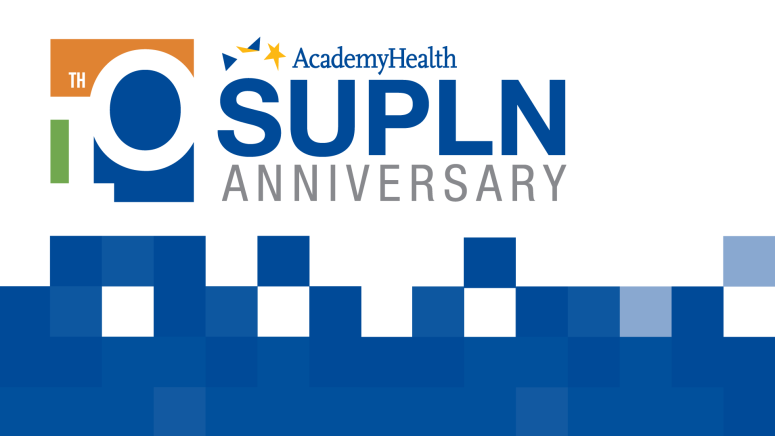
Starting a career in research can feel overwhelming, especially for those of us seeking meaningful connections between our work and real-world change. For early career researchers like myself, it can be difficult to find the right resources, mentors, and collaborative networks that allow our work to directly influence policy and practice. That’s where partnerships like AcademyHealth’s Medicaid Outcomes Distributed Research Network (MODRN) and the State-University Partnership Learning Network (SUPLN) come in. These partnerships not only bridge the gap between academia and state-level policymaking but also provide young researchers with the tools, data, and mentorship they need to produce timely, actionable research.
In celebration of SUPLN’s 10th anniversary, I’d like to share my own path—from transitioning out of traditional lab science to health services research—and the stories of three incredible early-career colleagues I’ve met through MODRN. Together, we’ve benefited from the mentorship, data access, and collaborative spirit that define these networks, allowing us to tackle pressing health care challenges with confidence.
A Nontraditional Path to Health Services Research
Four years ago, I was completing a postdoctoral fellowship in behavioral neuroscience and pharmacology, anxiously contemplating what to do next. I knew that the research I was doing wasn’t right for me – I put a strong emphasis on real-world impact, and I felt like my studies were too abstract to make a tangible difference. My late brother was struggling with substance use disorder and serious mental illness at the time, and I wanted to do something that could help make life better for people like him.
A friend of mine was training in health policy and data science, using large datasets to generate evidence that could be used by policymakers and others outside of academia. As I completed my postdoc, I transitioned into a staff role with my mentor, Jeff Talbert. Dr. Talbert gave me the opportunity to work with MODRN and introduced me to the concept of state-university partnerships. I loved the idea of asking state partners what they need for evidence-based policy making, using this guidance to craft timely and impactful studies. I was also thrilled to learn that these partnerships could give me the opportunity to analyze data from my state. No one was working in a vacuum and hoping it would matter; we had the right questions and the data to answer them.
As I became more involved, I had the chance to lead my own MODRN study. My colleagues were warm and friendly, teaching me to develop and hone an analysis plan for my first health services research paper, focused on urine drug testing. Many of these colleagues have grown into lasting mentors, helping guide my professional development within and beyond MODRN and SUPLN. As I’ve transitioned into a junior faculty role at University of Kentucky, my involvement with SUPLN has helped me learn more about the needs and priorities of my state partners while my MODRN colleagues have helped me build the skills and resources to conduct impactful health services research.
Making the Work Matter
Known for her sharp wit and ability to keep teams energized, Lindsay Allen’s work with MODRN has given her the opportunity to collaborate closely with Medicaid policymakers across the country. These experiences have helped her understand the practical challenges state agencies face when balancing budget constraints with efforts to improve health outcomes. Through her partnerships, Lindsay has been able to tailor her research to directly address the needs of policymakers. Recently, she’s expanded her focus by integrating tools from implementation science into her health economics and policy work, ensuring her research stays relevant and useful for state partners.
Getting More out of Administrative Data
Anna Austin is a leader in finding new ways to leverage data, such as creating novel linkages of state data sources to gain broader insights into the prevention of adverse childhood experiences, including child abuse and neglect. MODRN gave Anna a unique opportunity to hone her skills for developing measure definitions, as she led a project to identify telehealth treatment for opioid use disorder. Rapidly shifting telehealth policies, in the early COVID-19 pandemic, gave rise to variation in how telehealth was billed and coded. Anna worked with her MODRN research partners to create state-specific definitions of telehealth care and to generate critical evidence about the use of this new technology. As she transitions into a new role with the Centers for Disease Control and Prevention, her keen eye for using data to inform action and her experience building projects with state partners will have far-reaching impacts on population health.
Turning Colleagues into Mentors
As a junior faculty member, Carrie Fry realized that she needed funding for professional and research development during this critical period in her career. She wanted to use Medicaid claims data to study residential treatment for substance use disorder, but two barriers stood in her way. While she had considerable support and mentorship for her career at her home institution, she did not have the right content mentor. So, she decided to leverage her network with MODRN. Carrie identified a colleague to serve as a content mentor through MODRN, who could provide training and guidance in residential treatment, Section 1115 waivers, and other nuances of Medicaid research. She also found other colleagues excited to work with her and provide additional insights and data for her K01. With MODRN, Carrie has developed strong mentorship and research opportunities to propel her career toward independence.
The models for both SUPLN and MODRN provide notable opportunities for early-career researchers to participate in high-quality, timely Medicaid analyses and forge relationships with more senior researchers and policy experts at partner universities and Medicaid agencies. Such opportunities are invaluable for researchers looking to contribute to the evidence base for tomorrow’s most pressing health policy issues. For more information about MODRN and the network’s projects, please visit the AcademyHealth website.